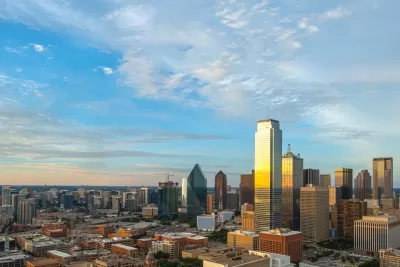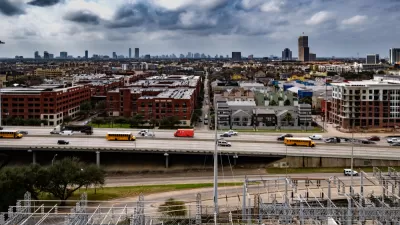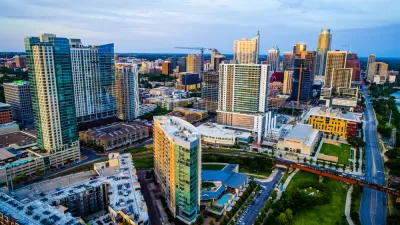Dallas will need voter approval to overcome tax increase obstacles put in place by the Texas State Legislature.

"Dallas is feeling COVID-19′s financial impact, and now officials may consider raising property taxes to shore up next year’s budget," reports Obed Manuel.
City Council members are considering a resolution that would set the stage to raise city’s property tax revenue grew by 8%. "The Texas Legislature last year capped property tax revenue increases at 3.5%. Anything higher than that requires voter approval," according to Manuel.
The City Council deliberates as the city prepares to deal with a loss of annual revenue somewhere between $73 million and $134 million as a consequence of the pandemic, according to the article.
For context of the tax revenue situation in Dallas relative to the other large cities in Texas, a new report by the Kinder Institute for Urban Research compares the tax structure of Dallas, Houston, and San Antonio, predicting that all three will have to reduce service as a result of declining revenue in 2020. Each of the three largest Texan cities will encounter constraints when trying to generate new sources of revenue to make up the difference, but the report specifically notes that new state law limiting property tax increases in the case of both Dallas and San Antonio.
Houston's constraints "include the locally imposed revenue cap, the lack of a solid waste collection fee, the fact that the city maintains its own health department and the sequestering of general fund revenues for public works under ReBuild Houston," according to the report.
For national context, the Lincoln Institute of Land Policy has created a new report to follow developments in property tax policies as cities deal with the financial consequences of the pandemic (in addition to gathering past work on property tax together as a resource for COVID-19). The "Property Tax and COVID-19" report is available to read online for free.
FULL STORY: Dallas weighing 8% property tax hike as city faces revenue shortages

Planetizen Federal Action Tracker
A weekly monitor of how Trump’s orders and actions are impacting planners and planning in America.

Congressman Proposes Bill to Rename DC Metro “Trump Train”
The Make Autorail Great Again Act would withhold federal funding to the system until the Washington Metropolitan Area Transit Authority (WMATA), rebrands as the Washington Metropolitan Authority for Greater Access (WMAGA).

DARTSpace Platform Streamlines Dallas TOD Application Process
The Dallas transit agency hopes a shorter permitting timeline will boost transit-oriented development around rail stations.

San Francisco's School District Spent $105M To Build Affordable Housing for Teachers — And That's Just the Beginning
SFUSD joins a growing list of school districts using their land holdings to address housing affordability challenges faced by their own employees.

Car-Centric LA Suburb Looks to a Train-Oriented Future
City leaders in Rancho Cucamonga, the future western terminus of the Brightline West rail line to Las Vegas, want to reimagine the city as a transit-oriented, pedestrian-friendly community.

New Alaska Bitcoin Mine Would Burn as Much Energy as the State’s Largest Coal Plant
Fueled by “stranded” natural gas, the startup hopes to become the largest in the US, and to make Alaska an industry center.
Urban Design for Planners 1: Software Tools
This six-course series explores essential urban design concepts using open source software and equips planners with the tools they need to participate fully in the urban design process.
Planning for Universal Design
Learn the tools for implementing Universal Design in planning regulations.
Municipality of Princeton
Roanoke Valley-Alleghany Regional Commission
City of Mt Shasta
City of Camden Redevelopment Agency
City of Astoria
Transportation Research & Education Center (TREC) at Portland State University
US High Speed Rail Association
City of Camden Redevelopment Agency
Municipality of Princeton (NJ)





























